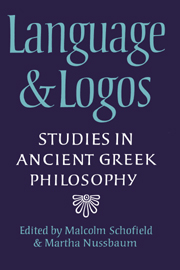Book contents
- Frontmatter
- Contents
- Preface
- Introduction
- 1 Heraclitus' conceptions of flux, fire and material persistence
- 2 Epistemology and meaning in Heraclitus
- 3 The dénouement of the Cratylus
- 4 Cratylus' theory of names and its refutation
- 5 Knowledge and language: the Theaetetus and the Cratylus
- 6 Falsehood and not-being in Plato's Sophist
- 7 Forms and dialectic in the second half of the Parmenides
- 8 Aristotle and the more accurate arguments
- 9 Aristotle on the principles of change in Physics I
- 10 Aristotle on natural teleology
- 11 Accidental unities
- 12 Aristotle's concept of signification
- 13 Saving Aristotle's appearances
- 14 Myths about non-propositional thought
- 15 Gods and heaps
- Bibliography of the publications of G. E. L. Owen
- Index locorum
- Index of names
9 - Aristotle on the principles of change in Physics I
Published online by Cambridge University Press: 09 October 2009
- Frontmatter
- Contents
- Preface
- Introduction
- 1 Heraclitus' conceptions of flux, fire and material persistence
- 2 Epistemology and meaning in Heraclitus
- 3 The dénouement of the Cratylus
- 4 Cratylus' theory of names and its refutation
- 5 Knowledge and language: the Theaetetus and the Cratylus
- 6 Falsehood and not-being in Plato's Sophist
- 7 Forms and dialectic in the second half of the Parmenides
- 8 Aristotle and the more accurate arguments
- 9 Aristotle on the principles of change in Physics I
- 10 Aristotle on natural teleology
- 11 Accidental unities
- 12 Aristotle's concept of signification
- 13 Saving Aristotle's appearances
- 14 Myths about non-propositional thought
- 15 Gods and heaps
- Bibliography of the publications of G. E. L. Owen
- Index locorum
- Index of names
Summary
Aristotle opens Physics I by stating that an inquiry into nature (peri phuseōs), like other inquiries, should begin with an account of the relevant principles (archai). He does not tell us what he means by ‘nature’ – for that we have to wait until book II – and he does not tell us what he means by a ‘principle’ in this context, but as we read on we may come to think this omission unimportant. For straightway at the beginning of chapter 2 he appears to place himself in the tradition of a series of writers on nature (peri phuseōs) whose views on the ‘principles’ (archai) were perfectly well known. Thus Thales held that there was one ‘principle’, namely water, while Anaximenes selected air and Heraclitus fire; Empedocles again held that there were four principles (earth, water, air, fire), Anaxagoras that there were infinitely many, Leucippus and Democritus that there were just atoms and void, and so on. So Aristotle, it would seem, is preparing to offer us his answer to the question to which these answers had already been propounded by his predecessors: he is preparing to list the ultimate ingredients of the world, and to given an account of how the world is made up from those ingredients. Perhaps this characterization of what the older physicists were up to is rather oversimplified, but I think it is not worth elaborating their problem now.
- Type
- Chapter
- Information
- Language and LogosStudies in Ancient Greek Philosophy Presented to G. E. L. Owen, pp. 179 - 196Publisher: Cambridge University PressPrint publication year: 1982
- 2
- Cited by



